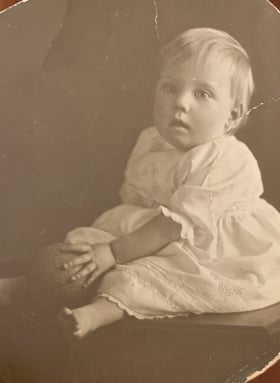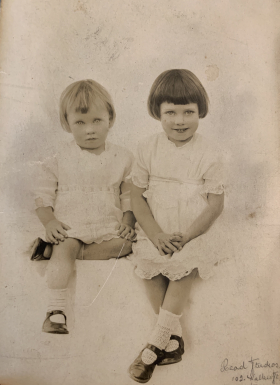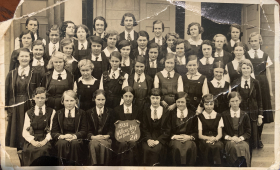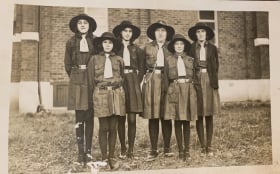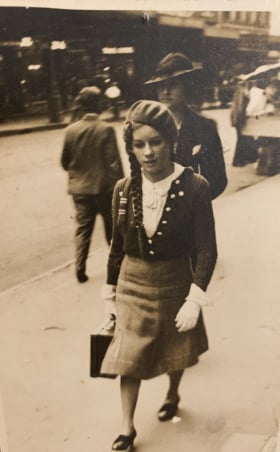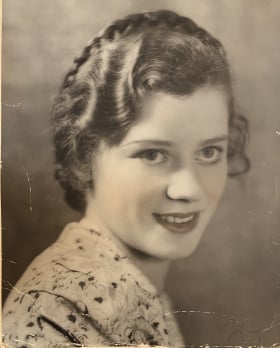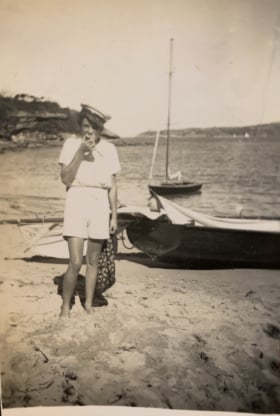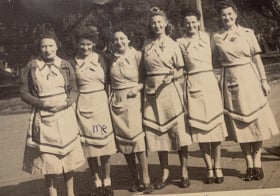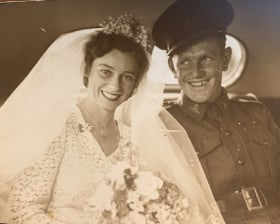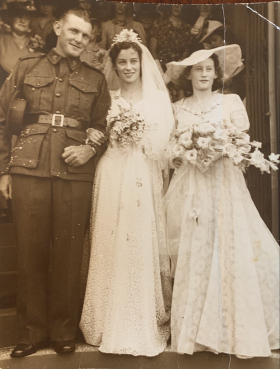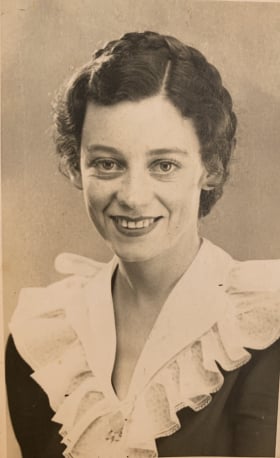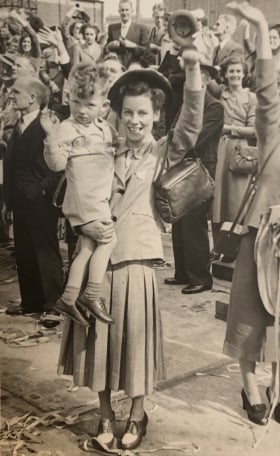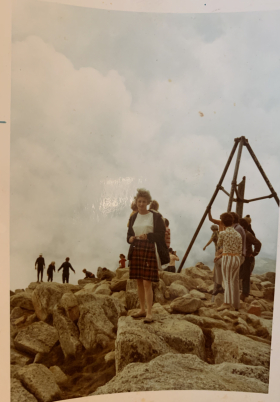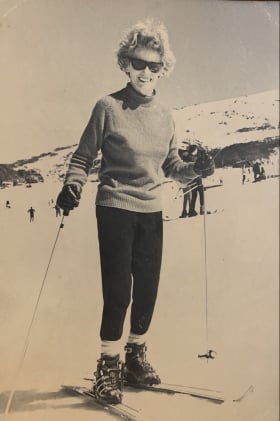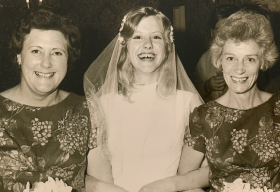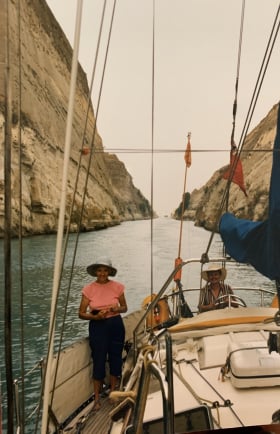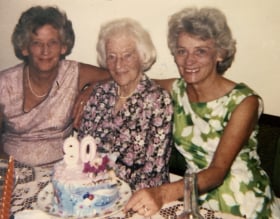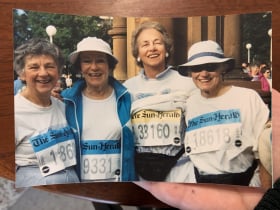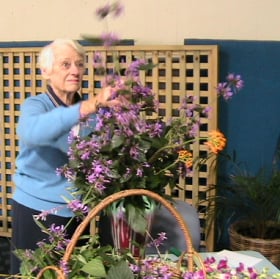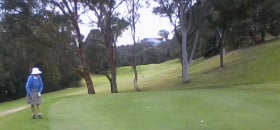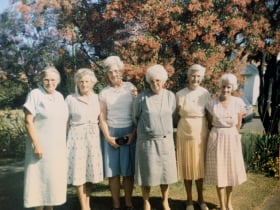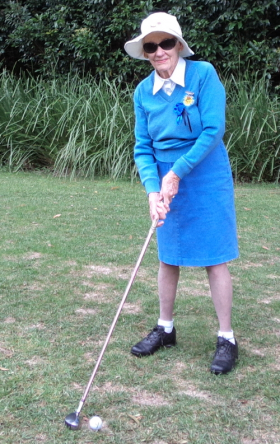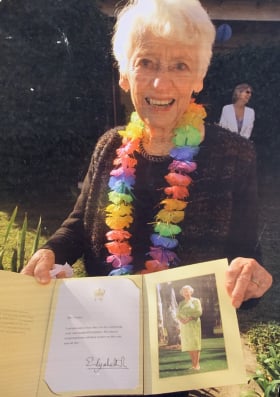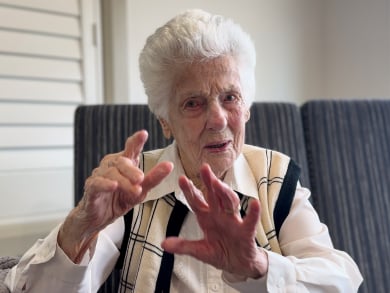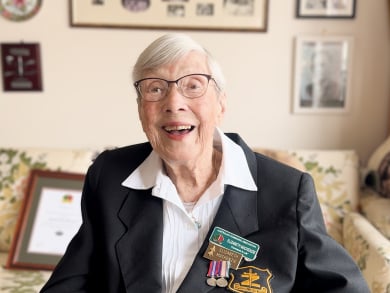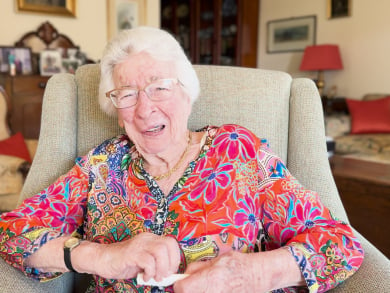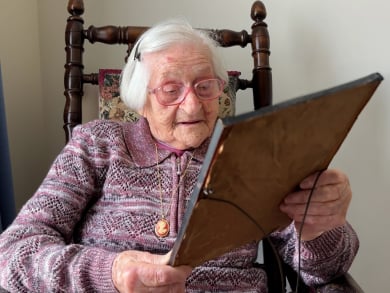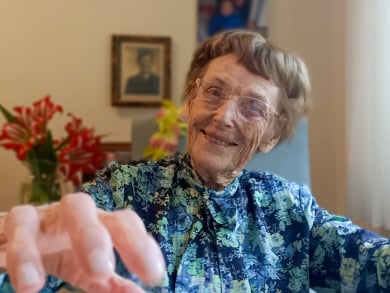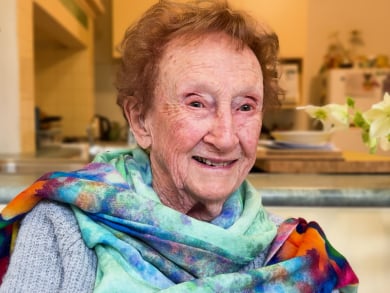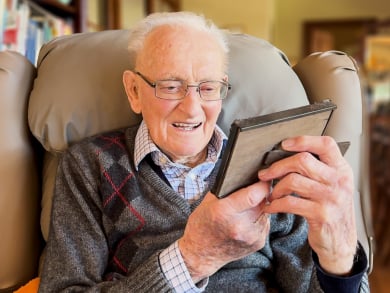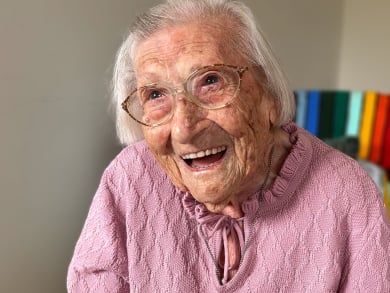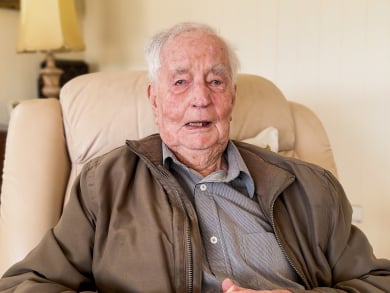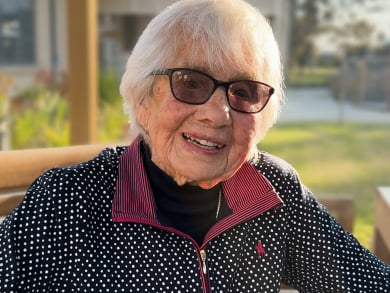Closed captioned icon
View audio transcription
This is the photo of the Queen
I got when I was a hundred.
I was very honoured, of course.
I mean, she doesn't personally do it all,
because there's too many of us.
But it's nice to get one.
And most people are interested,
you know, all want to know...
The first thing they ask me:
"Did you get a letter from the Queen?"
I say, "I got a photo of the Queen
and a card".
Oh, my parents were great.
Mum was Scottish, she came from Selkirk
and, ah, good cook and Dad was a gardener.
We had all our own vegetables and
chooks and ducks.
And then we had the holiday place
and they were great fisherfolk.
But my parents did a lot of fishing.
Dad was a
lifesaver at
Freshwater before the First World War
and then he was a stretcher bearer
in the Fifth Field Ambulance.
Went to Gallipoli and Europe.
He never talked about the War
much actually.
And in his diaries,
he never spoke about all the blood
and gore and everything, you know,
some people when they wrote diaries,
they mentioned, you know,
all about the wounded, but Dad...
He might say, "I've been on duty
so many hours" or something,
but he didn't say what the cases were,
how bad and the people were, you know.
But his father was interesting.
Thomas Power.
He interviewed Ned Kelly
and he was the first journalist
to reach Glenrowan when Ned was on the run
and he actually interviewed Ned
when he was caught
but he told Dad, Ned had nothing to say.
Shorthand, typing and bookkeeping
and English, because I remember
we had spelling, a lot of spelling.
But I was always a good typist. At school,
the headmistress used to get me
to type stencils because I was accurate.
I didn't make mistakes.
So when I was at Business College,
if you had the highest speed, and correct.
No errors.
You wore a brooch.
And I won it one time
and I didn't say anything to the family.
We were just having dinner one night
and my father spotted it and he said,
"What's that you've got on you?"
And I told him.
But I only go it the once
but at least I did get it.
A Jewish lady asked for volunteers.
So I was the only one in the office
that volunteered.
So after work we'd take orders
from the servicemen,
what they wanted to eat
and then pick it up
and bring it to the tables.
And then when the meal was finished
and we'd washed up,
that was when I first saw a dishwasher,
and we went into another room
and we'd dance.
So we ended up dancing
with the servicemen that were there.
Rae and Zara Isaacs.
Zara, I think, was the boss that ran it.
It was a big building in Hyde Park
and it had the big room, big kitchen
and this other room where we danced.
So it must have been pretty big,
but the food was pretty good.
It wasn't very varied
but it was good quality.
I remember the corned beef was very,
very good.
And of course, sausages, curried
sausages, was one of them I remember.
I wasn't terribly good
at remembering whose order was what.
I'd bring the trays and they'd have to
sort out their orders, half the time.
I wasn't meant to be a waitress...
But it was something...
and then another job we did.
In Bridge Street there was a place
where you just entertained them.
You played table tennis or you danced
with them or you just talked to them.
Yeah, I'd forgotten about that one, yeah.
I've forgotten what that was called now.
I think they were just...
needed company, someone to talk to them
themselves, the servicemen.
And during the War I met up with
an American one up at Coolangatta.
Another girl from work and I, in 1944,
we went to Coolangatta.
There were a lot of Americans
and one was staying in the guest house
where we were, and they asked me
to show them how to surf.
They were watching me in the surf
apparently.
And so I had a platonic
friendship with that fellow.
I can't even remember his name now.
Up at Coolangatta
they had this "Jazzland"
I think they called it.
Watching all the Americans
do all that dancing they did.
You know? Remember?
I could never do it.
So I like to work.
Doing shorthand and bookkeeping.
Typing.
But during the War I worked
for the Department of the Interior
and I was secretary
to the accountant there.
But then when the War ended,
all married women
got a letter saying
we all had to leave on the 31st December,
unless we were already a War Widow,
which I wasn't then, of course.
So that's when I left, at the end of 45.
And when the War ended,
a lot of people had been in the streets
and rejoicing and dancing and everything.
But I felt the opposite. I felt,
sort of, not cheerful exactly, but
glad the War was over, you know.
I have a cousin, prisoner of war,
who actually died before the War.
We didn't know until after the War.
And my brother, my husband
and my brother-in-law
were all in the army, you know.
So I went on the roof.
That's where we were.
I just was up there for a while.
I don't know what I was doing
but that's where I....
Then I went home to Mum,
be company for Mum.
Then afterwards, the others in the office
were dancing and singing in the street
but for some reason or other
I didn't feel like that.
I just...
Just felt I should be with Mum, you know?
But as it turned out,
my mother-in-law has a heart attack
and Noel was still in the army.
And I went down to
Greenwich and I did the cooking,
running the house for six people.
And then Noel was discharged in February
and I got pregnant straight away.
But luckily
my mother-in-law was back on her feet by then.
Yeah well the first real date
was to see "Four Feathers" at
the State Theatre.
Front seat of the dress-circle
and a box of chocolates and ice cream.
And that continued all the time.
We still got my box of chocolates
and ice-cream in the interval.
As I say,
we both were the same kind of people.
Well, my mother was like that.
You know, you're careful with money,
not mean,
but careful that you didn't waste it on...
Like we never went out for dinner
and things like that
because we were saving up to build.
I've still got the plans
of the house actually, but of course
we never got around to building
because of him dying.
His name was Noel, Noel Tanner.
Noel Clifford after his father.
And that was our wedding day
on the 16th of January 1943.
Leaving Stephen's Church
only to drive
King Street where the reception was
at a place that the guests
could all walk
to because of petrol rationing.
People didn't have petrol for their cars,
so that's why we were married in the city.
I remember they had big gladioli
in the church and my bridesmaid
was carrying pink gladioli
as though it was all arranged, but it wasn't.
And when I was going, there were soldiers
on guard outside State Government
and the soldiers saluted me
when I was going along to the wedding.
Then an uncle of mine
put a boot behind the car
that took me down to the reception.
He tied a boot behind it...
the car going along .
So we went to Newcastle for our honeymoon.
We were staying in a hotel
that overlooked the beach.
So when I was first going I'm thinking
Newcastle, BHP and things, you know.
But instead of that,
we were overlooking the beach
and we swam in the beach
and so we liked it so much
when he got leave 18 months later,
we went back again to the same hotel.
We knew each other a
long time
before we started going out together
and we were friends
before we fell in love with each other.
He fell in love with me
earlier, apparently.
So I think that had a lot
to do with it.
We were friends
before we became husband and wife.
And he was easy to get on with.
We never had an argument.
We didn't agree on everything,
especially politics.
He was a bit of a socialist
when I met him,
whereas I was always
just following my parents voting.
'UAP' I think it was called in those days.
But we never fought about anything.
We never arguments or fights
or anything like that.
Maybe if we had been married longer,
we probably would,
but only being married
those few years, you know, because
he came back in 1946
and he died in 49, so
we didn't have long together,
but he was so easy to get on with
and as I say, no fights,
no arguments or anything.
I have friends that argued before
they were even married, they'd have fights
and not talking to each other.
I couldn't imagine it.
They weren't even married
and they had fights, you know.
So that's why I never was interested
in anyone else...
because I had such a happy marriage.
A good marriage.
Now what happened first of all?
His testicle filled with blood.
And he went to the doctor and had it drained
and then he said
he'd have to cut the testicle.
So in November they cut the testicle off.
Then he went in the
Sydney Hobart yacht race.
Then he went again
in Easter in a yacht race
to Jervis Bay, on Mistral.
And then he had a backache
and then it turned out in May,
when he vomited,
and had pain, it turned out to be a tumor
in his stomach.
Bu they treated him for six weeks
for a stone in the the kidney before that.
So in October he died as quick as that.
At Gloucester House.
I rake up the leaves every so often too.
They're very slow this year.
I've always done something.
Rollerskating, ice skating,
a lot of walking, in the summer
we swam, in the winter we walked,
tennis, vigaro, hockey
and I did try skiing, snow skiing.
Not terribly good at it, but nice.
But the golf's been the main thing.
I love the golf. And to go to Northbridge
when we had to play on a Sunday,
I had to walk a mile uphill
and get two busses.
And then they were going to build
the new one at Lane Cove.
So I've been a member there since.
Well, 1961 we paid five shillings to join.
Last time I played,
a nine year
old boy played in the competition.
I don't know how but he did,
and he got more points than I did.
And Jo said, when we finished, "Made
my day, I played with a 99-year-old
and a nine-year-old".
So we went my niece's wedding
and it was formal,
so I bought quite an expensive frock,
and when we arrived at the church,
her neighbour
had exactly the same frock on.
So we stood with the bride
with the bridesmaids' bouquets
as though we were bridesmaids.
They were purple. Big bunches of flowers on.
A bustle-type frock.
All very flat
in the front and full on the back.
So it was quite a joke.
Young people,
they spend so much money going to cocktail bars
and spending $10 a drink
and things like that.
And then next thing you know,
they've got all this
debt on their credit cards
and things.
I can't understand it, you know.
Never, ever been in debt my whole life.
I've always just lived
within my means sort of thing, you know.
So that's my advice for young people,
you know.
Don't be extravagant.
Save for the future.
Whether you're single or married,
because single people can buy a home now
and have a flat or a unit if they want to
on their own, if they save.
But then
they all complain
because they haven't got any money but
I think they waste too much.
Not everyone, but a lot of them.
Thanks To
Marghanita da Cruz
Margaret Tanner
"we were friends before we fell in love with each other"
Centenarian Margaret played golf until she was 99!
Margaret philosophy is all about giving it a go and that’s how she has lived her life whether it be volunteering during WWII or playing all kinds of sports.
She played golf with a nine-year-old when she was 99!
She had a very special marriage. They wed during the War but his early death meant, sadly, that it only lasted a few years. “I was never interested in anyone else”.
Her parents were important to her as revealed in her stories. Her father was a stretcher-bearer at Gallipoli and her Great Grandfather, a journalist, interviewed Ned Kelly!
Age in Video
102 yearsDate of Birth
10th August 1920Place of Birth
Chatswood, NSW, AustraliaThanks To
Marghanita da Cruz
